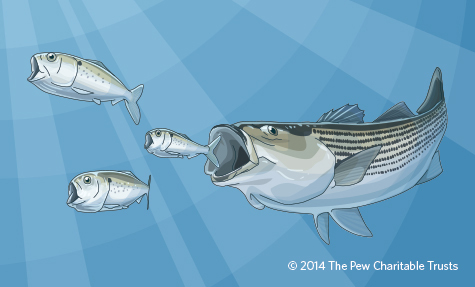Forage Fish: The Oceans' Little Heroes
Most Americans don't think about fisheries policy when eating fish. But in fact, the supply of popular species such as cod, tuna, and salmon depends very much on how we manage them in the sea. If anglers, chefs, and diners want to continue catching, cooking, and eating fish, we need to change our policies so we can maintain the health of the small fish that nourish the larger ones.
Species such as herring, menhaden, and sardines—commonly known as forage fish—make up the menu for much of the wildlife in our ocean. These schooling fish eat tiny plants and animals near the ocean's surface. In turn, they are eaten by a host of other animals—including larger fish, seabirds, and whales—making them a vital part of the marine food web. Studies have shown, for example, that forage fish can compose up to 70 percent of a king salmon's diet.
Fishermen have long appreciated the relationship between forage fish and larger species, but over the past decade a growing body of research into the ecological roles of these small fish has added new scientific insights. This includes perhaps the most comprehensive study to date, conducted by the Lenfest Forage Fish Task Force: 13 eminent scientists convened by Stony Brook University's Institute for Ocean Conservation Science.

A striped bass chasing some menhaden.
The report from the task force's three-year analysis, released in the spring of 2012, found that "globally, forage fish are twice as valuable in the water as in a net—contributing $11.3 billion by serving as food for other commercially important fish." So to foster healthy ocean ecosystems where bluefin tuna and other depleted commercial and recreationally important species can thrive, our nation must enact consistent polices to ensure that enough forage fish are left in the water to sustain ocean wildlife.
The Pacific Fishery Management Council, which manages more than 100 species from California to Washington State, has already recognized the importance of forage fish to healthy marine ecosystems. The council voted unanimously in September 2013 to amend existing fishery management plans in order to "prohibit the development of new commercial fisheries" on forage species, such as sand lance and saury, that are not currently managed or monitored. This action builds on proactive steps that the North Pacific Fishery Management Council took in Alaska beginning in the 1990s to protect the food that key commercial species depend on in the region that council oversees.
Much remains to be done. But an impressive coalition of commercial fishermen, sport fishing organizations, ecotourism businesses, conservation groups, and others has come together to ensure that the Pacific Fishery Management Council translates its goals into firm, enforceable policies. Progress in protecting key forage species in other parts of the country, however, has been opposed by certain commercial fishing interests and some state and federal fishery management officials. This jumble of conflicting state and federal policies on forage fish conservation should not continue.
As the Lenfest task force warned in its report, "Conventional management can be risky for forage fish because it does not adequately account for their wide population swings and high catchability. It also fails to capture the critical role of forage fish as food for marine mammals, seabirds, and commercially important fish such as tuna, salmon, and cod."
So if we want to protect the future of blue marlin, Warsaw grouper, and other depleted species, we need to ensure that these predators have ample forage fish to prey on. In addition to action by the regional fisheries councils, Congress should approve a uniform national approach to fisheries management that takes into account the health of marine ecosystems and the critical interactions between prey and predator species.
Forage fish populations in U.S. waters deserve proactive and consistent management that recognizes their unique role in supporting healthy oceans. This is a fundamental component of an ecosystem-based approach to fishery management. We have the science. Now we need the policies to take better care of these small but hugely important species that knit together the marine food web.
Note: This is the second article in a special series on managing U.S. fisheries using an ecosystem-based approach. Read the previous article: "A Better Way to Protect Our Ocean Ecosystems."
